Best acoustic guitar strings 2026: Find your favourite acoustic strings
Our pick of the best acoustic guitar strings for your style and budget from Elixir, Ernie Ball, Martin, D'Addario, and more
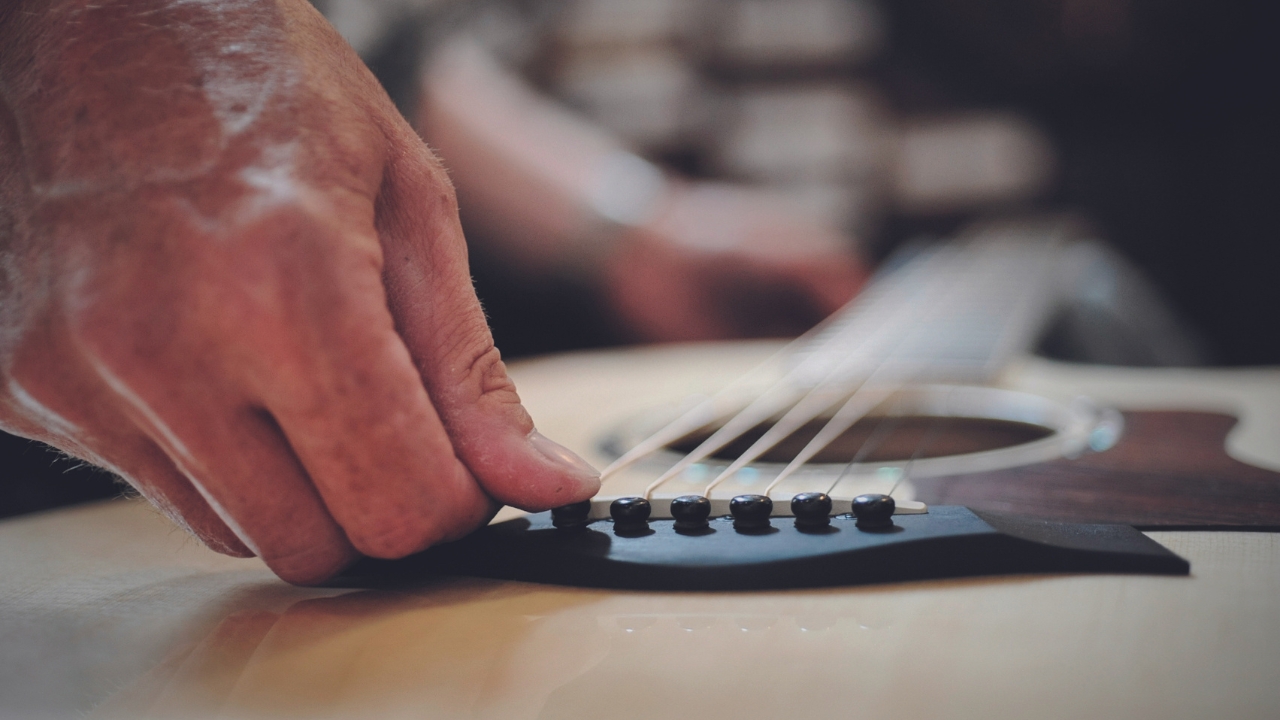
Want all the hottest music and gear news, reviews, deals, features and more, direct to your inbox? Sign up here.
You are now subscribed
Your newsletter sign-up was successful
So you're on the hunt for the best acoustic guitar strings? Maybe your current strings are feeling kinda stale, and you're ready to switch things up, or you're just starting out and want some friendly advice on what to grab. I've been strumming away for over 20 years, and my guitar stash includes everything from tiny travel guitars to classical beauties, so I'm here to help you find the perfect match for your acoustic.
Strings are incredibly personal, and when I'm choosing a set, the most important factor is the gauge. While strings from different manufacturers might feel slightly different, a string is a string at the end of the day. Changing your brand of strings may impart some slight differences, but changing gauge will make a world of difference in the playability and sound of your instrument. I go into this in much more depth in the FAQs of this article, so definitely give that a look if you want to understand more about your string gauge.
The additional significant consideration you must address involves treated versus untreated strings. Once more, a clear distinction exists in texture and tone between these two categories. In my experience, treated strings produce a slightly less bright sound than untreated varieties, yet I insist on them for my performance instrument because they endure remarkably well. Regarding my living room instrument or studio work, though, untreated strings remain essential, since tonal quality takes top priority there.
Look, I get it, making these choices can feel overwhelming, which is why most of us just stick with what we know works. But here's my advice: experiment with new strings and try different gauges on your guitars! It can completely shake things up in the best way and might be just what you need if you're feeling uninspired. I've rounded up six killer acoustic guitar strings below, each one perfect for different situations.
Product guide
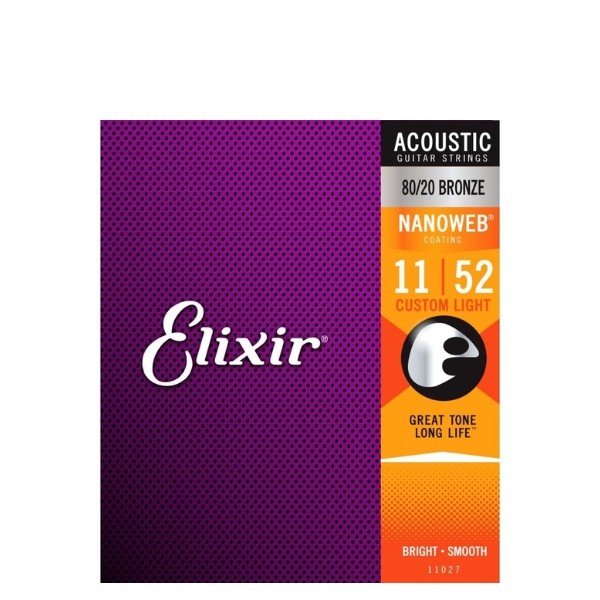
Material: 80/20 bronze
Coating: Nanoweb
+ Great sound
+ Long-lasting
- Not cheap
All of my gigging acoustic guitars have a set of Elixirs on them. If you want something that will last, then there's not much better than these, and regular wiping down after you're done makes them last even longer.
Admittedly there is a 'feel' to them that might seem alien if you're coming from an uncoated string, but out of all the sets I've tried these are as close to a traditional string feel as it gets.
The sound is slightly muted compared to some of the non-coated strings here, but unless you're recording with a condenser mic it's doubtful you'll notice the difference. They can also be a great choice for an acoustic that's too bright, as the sound is a little more toned down.
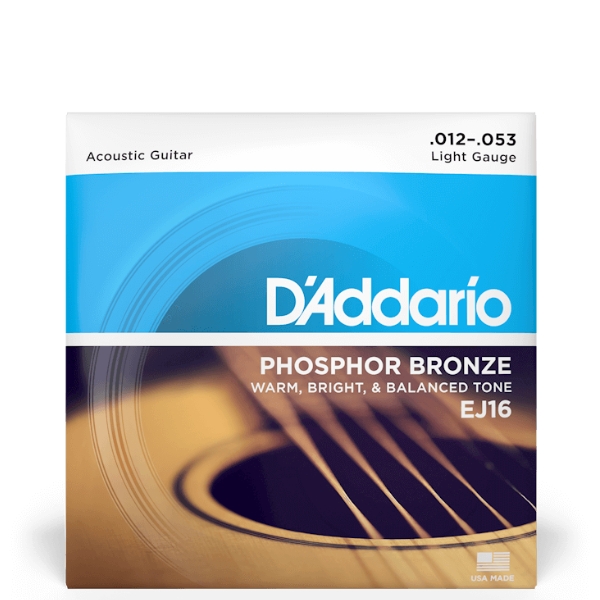
Material: Phosphor Bronze
Coating: N/A
+ Value for money
+ Loads of gauges
- Not long-lasting
I've been using EJ16s for years now, in fact, they were the first set of acoustic strings I bought for myself back when Blink 182 and Sum 41 were tearing up the charts.
I still use them now thanks to their excellent combo of value for money and the huge range of gauges. It makes them great for trying out different sets on different acoustics to get the best playability from your instrument.
Sound-wise they're fantastic too, giving a nice open voice to any acoustic they're fitted to. The only real downside with these is that they won't last that long as they're uncoated, but at this price, it's not a huge deal if you don't mind changing strings regularly.
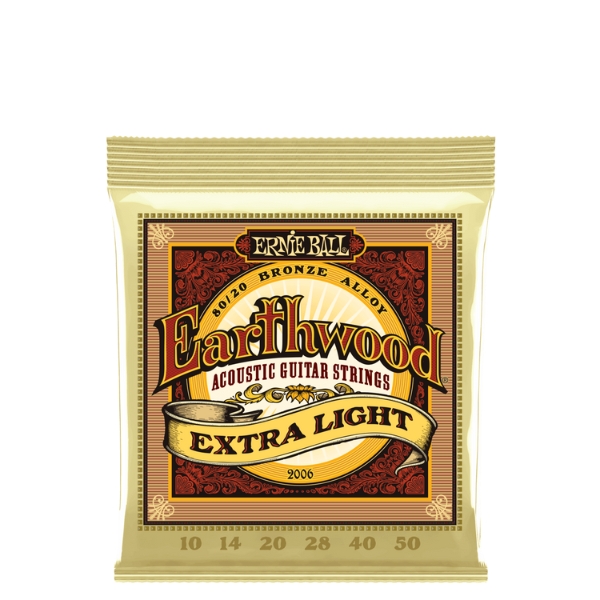
Material: 80/20 Bronze
Coating: N/A
+ Super cheap
+ Balanced sound
- Finger squeak
I pretty much exclusively use Ernie Ball electric guitar strings, and their Slinky range is probably one of the best-known string brands out there but for some reason, they seldom get love for their acoustic strings.
The Ernie Ball Earthwood range is a great dirt-cheap option that is more than capable if you're on a budget. I don't use them all that much to be totally honest, but I'd definitely recommend them for a beginner looking for their first string set.
Overall the sound of these strings is fantastic, although I find them a little squeaky with finger noise compared to some others here. If you want to try out a bunch of different gauges without spending loads, these are the perfect choice.
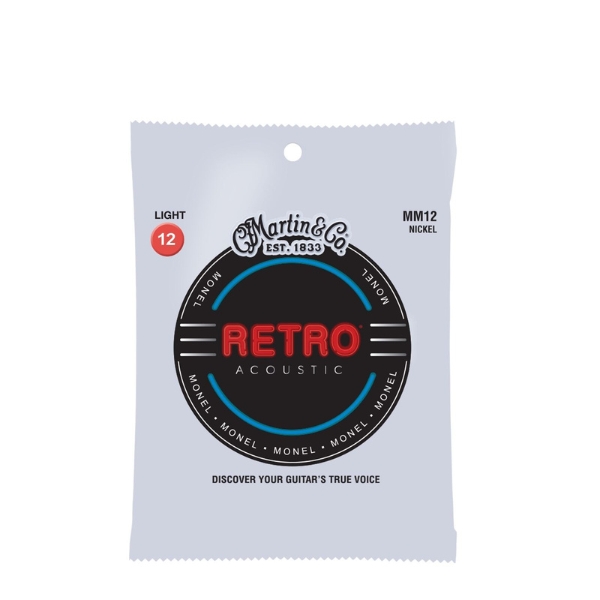
Material: Nickel Copper
Coating: N/A
+ Warm tone
+ Good value
- Not the brightest
While there's no specific set of strings that are required for fingerpicking, I prefer a set that's a little less clanky and trebly for my fingerstyle acoustics.
The Martin Retro set ticks that box perfectly, providing a much warmer tone out of the packet than a regular set. This is down to the nickel/copper wrap that differs from others on this list, providing a more toned-down sound.
I found them surprisingly long-lasting for a non-coated string and while I appreciate not everyone will love that warmer sound, I think they're a great choice for the fingerpickers out there.
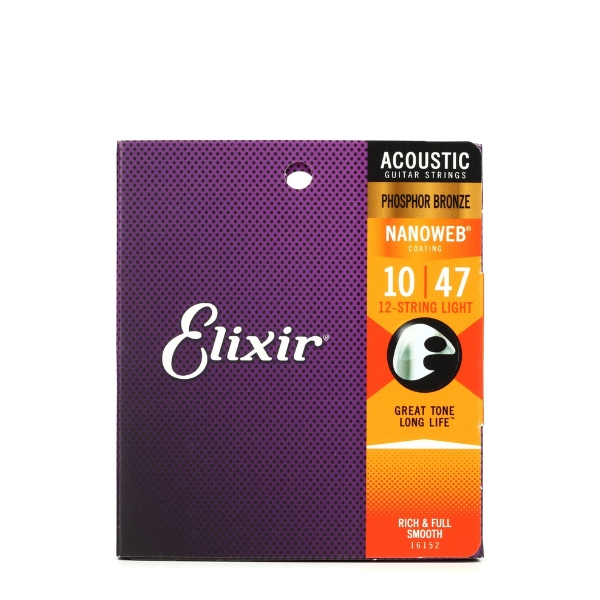
Material: Phosphor Bronze
Coating: Nanoweb
+ Beds in quick
+ Long lasting
- Expensive
Not many players enjoy restringing their guitars, but doing it with a 12-string is an absolute pain. I only have one 12-string in my collection at the moment, but you can bet I dread every time it needs a restring.
My main reason for loving Elixir's on my 12-string is that the coated strings lengthen the amount of time between string changes. They're not cheap, but I'll happily pay the price to win back some valuable time.
I really love the sound on a 12-string too. Too many overtones can be really noticeable on a 12-string guitar, but with the Elixir's they're slightly more muted due to the coating, and they settle in a lot quicker than a regular, uncoated set.
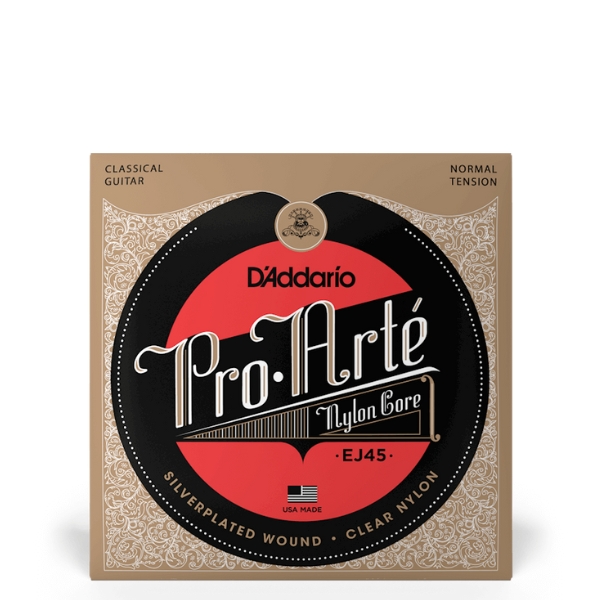
Material: Nylon, Silver-Plated Copper
Coating: N/A
+ Warm sound
+ Balanced tension
- Some prefer high tension
If you’re restringing a classical instrument, I think the D’Addario EJ45 Pro-Arte nylon guitar strings are some of the best in the game. Two of my classical guitars are currently strung with a set of these, and they do an excellent job.
D’Addario uses a multi-filament nylon core, which in plain English means a consistent response and warm tone. The treble strings are clear but not overbearing, making it easier to get a balanced sound when you're fingerpicking.
I prefer the normal tension set, which gives me a nice balance between playability and projection. You might prefer the volume of a higher tension set, particularly if playing purely acoustically, and D’Addario does offer a set if you want more volume from your classical guitar.
How to choose

Choosing acoustic guitar strings can feel a bit like picking out a new pair of shoes – there are plenty of options, and the wrong choice might leave you feeling uncomfortable or just not quite right. But fear not, MusicRadar is here to breakdown everything you need to know about choosing the best acoustic guitar strings.
First off, think about the gauge of the strings. If you're not sure what that means, it's basically the thickness of the strings. Lighter gauge strings are easier on the fingers, which is great if you're just starting out or if you fancy bending notes. They can be a bit tinkly, though, which some folks love while others prefer a meatier sound. On the flip side, heavier gauge strings pack a punch when it comes to volume and projection but can feel like wrestling with a particularly stubborn cat when you play them. It’s all about finding that sweet spot that suits your playing style.
Next up is the material. Acoustic guitar strings come in a variety of materials, and this can dramatically affect your tone. Bronze strings, for example, give you a bright, crisp sound that can really shine when you strum. On the other hand, phosphor bronze strings add a bit of warmth and are generally a bit more mellow, perfect for those lovely fingerstyle pieces. You might also come across coated strings that are designed to last longer and resist grime - if you're the type who forgets to clean your guitar for weeks on end, these could be the set for you.
It’s also worth considering whether you’re playing in standard tuning, or if you fancy getting adventurous with alternate tunings. Some players swear by using heavier strings for alternate tunings to maintain proper tension.
Lastly, don’t hesitate to experiment. The beauty of it all is that you can switch things up and see how different strings affect your sound and playability. Pop down to your local music shop, have a natter with the staff, and try a few different types. It’s all part of the journey, and who knows, you might just stumble upon your new favourite strings.
Glossary of terms
- Action: The height of the strings above the fretboard, influencing playability and comfort.
- Alternate tuning: Any tuning that differs from standard EADGBE tuning, allowing for creative expression.
- Ball end: A small metal ball at one end of the string, making it easier to attach to the guitar.
- Bronze: A common string material that provides a bright and clear tone.
- Coated strings: Strings treated with a protective layer to resist dirt and prolong lifespan.
- Fingerstyle: A method of playing where you use your fingers to pluck the strings individually.
- Frets: The metal strips on the guitar neck that divide the neck into sections; pressing the strings against them changes the pitch.
- Gauge: The thickness of the strings, affecting playability and sound. Thicker strings are heavier, while thinner ones are lighter.
- Intonation: The accuracy of pitch along the fretboard, essential for proper tuning across different notes.
- Nut: A small piece at the end of the neck, guiding the strings and separating them from the fretboard.
- Phosphor Bronze: A variation of bronze with added phosphor, offering a warmer, richer sound.
- Saddle: A piece on the guitar body where the strings rest, affecting tone and action.
- Tension: The amount of pull on the strings, which can influence tuning stability and string feel.
- Wound strings: Strings that have a metal winding around them, typically used for lower notes.
- Plain strings: Unwound strings, usually used for the higher notes on the guitar.
FAQs
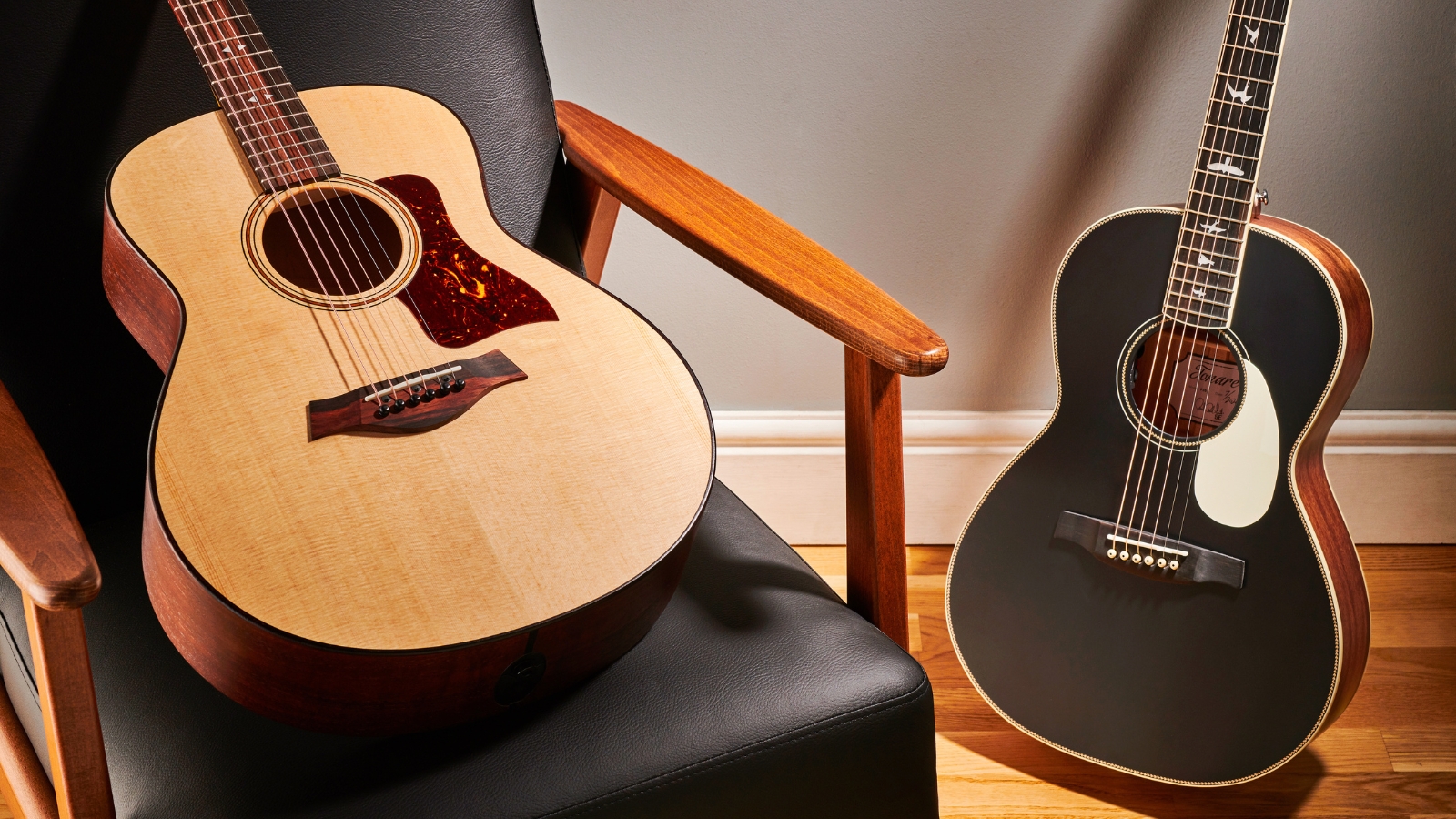
What is the best string gauge for acoustic guitars?
The gauge of a string refers to its thickness or diameter - the bigger the gauge, the thicker the string. This has an impact on the playability and tone of your guitar, as well as how you play it.
Guitar strings are measured in 1/000th of an inch, and packaged in sets that are typically referred to by their thinnest string, the high E. So a “set of 12s” will have a high E string that has a 12 gauge, measuring 0.012 inches across its diameter.
Thicker strings will generally sound fuller. They tend to be louder than thinner strings and will have a rounded, bassy low end. They’re more durable than thinner strings, which is a major pro - but there are drawbacks.
If you’re still building up strength in your fretting hand, then thick gauges can make for a pretty challenging playing experience - especially if you like to bend strings and play fast runs. If you’re a heavy-handed strummer or like to tune down though, thicker string gauges are your friend.
Lighter gauge strings are a bit easier to fret and bend, and they sound a lot brighter. The trade-off is that you lose some of that deep bottom end. For some players, it’s worth it. But not all.
Take a look at your guitar. If you’ve got a smaller-bodied acoustic guitar, then lighter gauge strings might complement the sound better. Likewise, if you’re the proud owner of a dreadnought or jumbo-sized acoustic, then thick strings might do the job. There’s no hard and fast rule though. Some people use heavier strings on smaller-bodied guitars to add more depth and vice versa. Experiment with it!
Which acoustic strings are best for beginners?
If you’re a beginner acoustic guitar player, it’s important to make sure that you’re using the most appropriate strings for you. You’ll want to find strings that toe the line between playability and tone, so it’s important to understand string gauges and the difference they make to your sound and playing experience.
These are some of the most common generic acoustic guitar string gauges. There will likely be some variation between brands, and some brands produce hybrid sets, but follow this as a general guide and you’ll never be far off the money.
Extra light: .010 .014 .023 .030 .039 .047
Custom light: .011 .015 .023 .032 .042 .052
Light: .012 .016 .025 .032 .042 .054
Medium: .013 .017 .026 .035 .045 .056
Heavy: .014 .018 .027 .039 .049 .059
If you’re playing in standard tuning, we’d recommend you use Extra Light or Custom Light strings. These may be referred to as ‘a set of 10s’ or ‘a set of 11s’ - and will offer a bright, punchy tone with a fairly low amount of string tension - meaning they’re easier to play. As you become more comfortable on your acoustic guitar, we’d suggest you try out some heavier strings - but there’s no need to go super heavy unless your style of playing calls for it.
It’s worth noting that if you play an electric guitar too, the names of each gauge will be pretty different. We’d avoid comparing acoustic and electric guitar gauges, as acoustic guitars generally need heavier strings to sound their best.
When should I change my acoustic guitar strings?
Knowing when to restring your acoustic guitar largely depends on how much you play your acoustic guitar, but as a rule, we recommend you restring your acoustic guitar every couple of months at the very least. This will keep your instrument feeling and sounding it's very best. If you use coated strings, you might get some extra life out of them - but once your strings start to sound and look dull, it’s time for a change.
What are acoustic guitar strings made of?
Acoustic guitar strings are commonly made of bronze, phosphor bronze, brass, nickel, silk, and steel.
Each material has its own timbre. Bronze sounds bright, with bell-like clarity and a wide treble-forward frequency response. As the name suggests, phosphor bronze sees phosphor added to the alloy to slow oxidation and extend string life. Phosphor bronze strings tend to sound a little darker and warmer than bronze.
Brass strings have plenty of top-end jangle, and nickel strings have a warmer tone making them an excellent vintage choice, as does monel – a nickel-based alloy that many guitarists swear by for getting the best out of their tonewood.
Are nylon guitar strings easier to play?
Long story short, yes they are. Nylon guitar strings are referred to as having high or low tension, with high-tension strings offering a heavier feel and low tension an easier-to-play feel. Even ‘high’ tension strings have less tension than a steel or bronze set - and it’s one of the main reasons why so many people start on a nylon string classical guitar.
In a set of classical strings, the top three strings are made from clear or rectified nylon, with the bottom three typically using bronze or silver-plated copper wire wrapped around a multi-filament core. You’ll only need nylon (sometimes known as ‘classical’) strings if you’ve got a classical guitar - and it’s important that you don’t get mixed up between nylon and steel strings. The difference in string tension means that if you put steel strings on a classical guitar, you run the risk of seriously damaging your instrument.
How we choose the best acoustic guitar strings
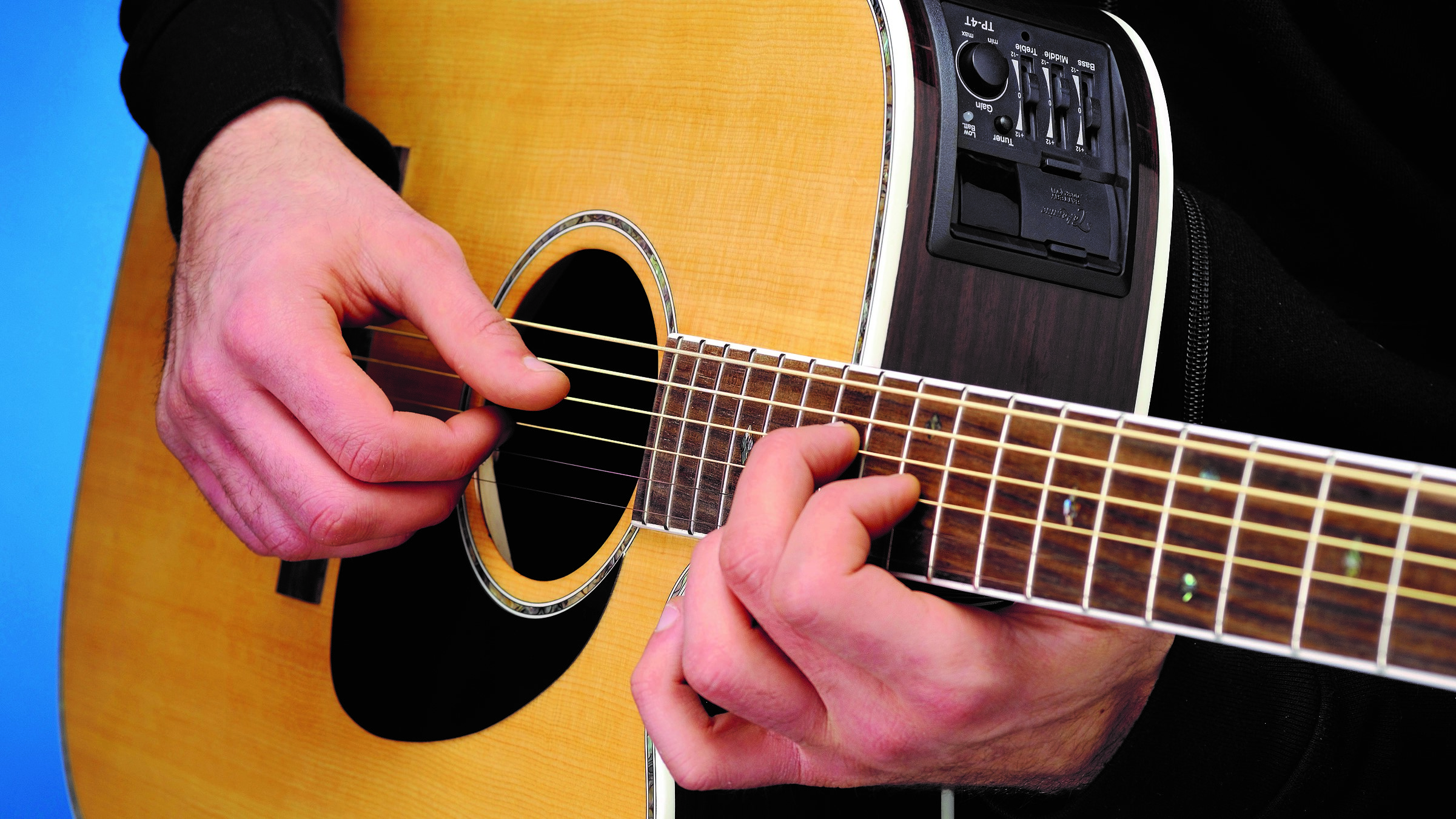
When I'm testing acoustic guitar strings, it's important that I put them through their paces over a fair amount of time to make sure they are right for your acoustic guitar.
I start by stringing up my acoustic guitar with a fresh set of strings and seeing how long they take to wear or 'bed' in. The purpose of this test is to see how long it takes for a set of strings to become fully stretched and stable in their tuning. The best sets of guitar strings will do this over the course of a few hours, requiring a little playing before they're fully settled.
Next, I'll test how the strings feel under my fingers. I'm looking for smooth strings that don't have any imperfections that will impede my playing. In the case of coated strings, I'd rather not feel the coating, but to be totally honest this hasn't happened to me yet. Coated strings pretty much always feel slightly different from uncoated ones.
Corrosion is one reason anyone should need to change their strings, so to test the usable life of the strings we'll keep the strings on our guitar for as long as possible and take note of when they start to discolor, tarnish and lose their spark.
All during the testing phase I'll be listening to how the strings sound. Through different playing styles, different songs, and different environments I'll have one ear out to see how the strings react, and also how they change over time.
I've listened to a lot of different acoustic guitars and string sets over the years, so I've got plenty of experience backing up my deductions. Ultimately the sound of something is my opinion, and I'm always aware that what sounds good to my ear might not to another musician.
Read more about how we test music-making gear and services at MusicRadar.
Why trust us?

☑️ Established 2007
☑️ 2.9 million monthly users globally
☑️ 9,500+ reviews on-site
With more than 17 years of experience, MusicRadar is the premier music-making website in the world. Run by musicians for musicians, we offer expertly written gear round-ups and high-quality, authoritative reviews by an extensive team of highly experienced industry professionals.
Below you'll find more information on the expert authors of this guide.

Jonathan Horsley has been writing about guitars and guitar culture since 2005, playing them since 1990, and regularly contributes to MusicRadar, Total Guitar and Guitar World. He uses Jazz III nylon picks, 10s during the week, 9s at the weekend, and shamefully still struggles with rhythm figure one of Van Halen’s Panama.

Matt is a Junior Deals Writer here at MusicRadar. He regularly tests and reviews music gear with a focus on audio interfaces, studio headphones, studio monitors, and pretty much anything else home recording-related. Responsible for over 60 buying guides, a large part of his role is helping musicians find the best deals on gear. Matt worked in music retail for 5 years at Dawsons Music and Northwest Guitars and has written for various music sites including Guitar World, Guitar Player, Guitar.com, Ultimate Guitar, and Thomann’s t.blog.
Want all the hottest music and gear news, reviews, deals, features and more, direct to your inbox? Sign up here.
Jonathan Horsley has been writing about guitars and guitar culture since 2005, playing them since 1990, and regularly contributes to MusicRadar, Total Guitar and Guitar World. He uses Jazz III nylon picks, 10s during the week, 9s at the weekend, and shamefully still struggles with rhythm figure one of Van Halen’s Panama.
- Matt McCrackenJunior Deals Writer